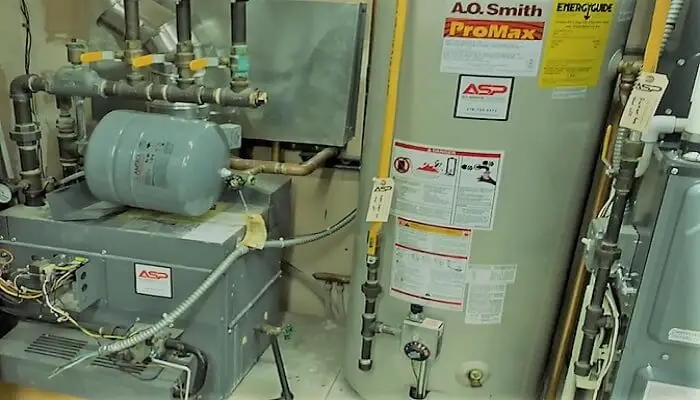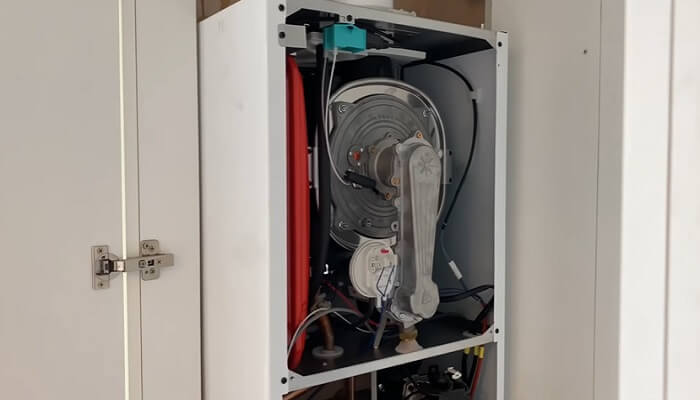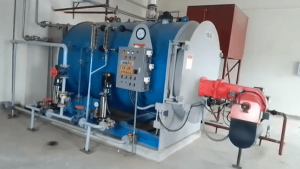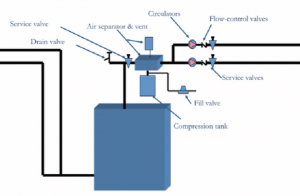Disclosure: As an Amazon Associate, I earn from qualifying purchases. Learn more
A boiler is a household appliance that provides central heating and hot water. Boilers are usually powered by natural gas, but can also be powered by oil, electricity, or solid fuels. Central heating is when the boiler provides warmth to the home by heating the radiators. Hot water is when the boiler provides hot water to taps and appliances in the home. There are several reasons why a boiler is important for you and your family.
First, a boiler can help to keep your home warm and comfortable during the colder months.
Second, a boiler can provide hot water for cooking, bathing, and cleaning.
Third, a boiler can help to save money on your energy bills.
Fourth, a boiler can improve the air quality in your home.
Fifth, a boiler can help to protect the environment.
Sixth, a boiler can help to extend the life of your appliances.
Seventh, a boiler can help you to save space in your home.
A boiler is a piece of equipment that involves flammable gas, oil, and electricity. This means that you need to have technician-level knowledge or have to call a technician to deal with any problems that may occur with it. Otherwise, your family members with you even your house, and assets may burn.
There are several common boiler issues that you should be aware of. If you experience any of these problems, take the initiative to have it repaired or contact a qualified boiler engineer.
Boiler Not Turning on
If you’ve ever gone to turn on your boiler only to find that it won’t turn on, you know how frustrating it can be. If your boiler isn’t turning on, don’t panic. There’s a good chance that you can fix the problem yourself. If not, you can always call in a professional to help you out.
1. Thermostat Issues
One of the most common reasons boilers stop working is because of thermostat issues. If your boiler’s thermostat is turned off, it won’t be able to turn on and heat your home. To fix this, simply turn on the thermostat and see if that does the trick. If not, you may need to replace the batteries or the entire thermostat.
2. Pilot Light Issues
If your pilot light is out, your boiler won’t be able to turn on. To fix this, you’ll need to relight the pilot light. This can be done by following the instructions in your boiler’s manual. If you can’t find your manual, there are plenty of online tutorials that can walk you through the process.

3. Dirty Filters
If your boiler’s filters are dirty, it can prevent it from turning on. To clean the filters, simply remove them and rinse them off with warm water. Once they’re clean, put them back in and see if that does the trick.
4. Broken Pipes
If there are any broken pipes leading to or from your boiler, that can prevent it from turning on. To fix this, you’ll need to find the broken pipe and either repair or replace it.
5. Electrical Issues
If your boiler isn’t turning on because of electrical issues, you’ll need to call in a professional. This is something that you shouldn’t try to fix yourself, as it can be dangerous.
And if your boiler is turned on but shuts off repeatedly, check if the pressure can be reduced or if there are any interruptions that could disrupt the system. It is better if you contact a registered engineer.
Read More: Oil Boiler Problems! What You Need to Know
Boiler Runs but No Heat
If your boiler is running but there is no heat, then there are a few possible issues that could be the culprit. The first thing you should check is the thermostat to see if it is set properly. If the thermostat is set too low, then the boiler will not kick on.
Another possible issue could be a tripped circuit breaker or a blown fuse. If this is the case, simply reset the breaker or replace the fuse and see if that solves the problem.
If your boiler still will not heat up, then there could be an issue with the pilot light. If the pilot light is out, then the boiler will not be able to ignite the gas and produce heat. relighting the pilot light should solve this problem.
If you see your boiler is working but the radiators are not heating, it may be due to a faulty boiler pump or your central heating control. And if your boiler is working properly but the radiators are cold, check that it may be due to the thermostat.
Finally, if none of these solutions work, then you may need to call a professional to take a look at your boiler and diagnose the problem.

Boiler Making Strange Noises
If your boiler is making strange noises, it could be due to a number of different issues. Below, we have listed some of the most common boiler problems and how to fix them.
1. Kettling: Kettling is when your boiler makes a loud rumbling or banging noise. This is usually caused by a build-up of limescale in the boiler. To fix this problem, you will need to descale your boiler.
2. Pump Issues: If your boiler is making a high-pitched noise, it could be due to a problem with the pump. This is usually caused by a build-up of sludge or debris in the pump. To fix this problem, you will need to clean or replace the pump.
3. Fan Issues: If your boiler is making a loud humming noise, it could be due to a problem with the fan. This is usually caused by a build-up of dust or debris in the fan. To fix this problem, you will need to clean or replace the fan.
4. Pressure Issues: If your boiler is making a hissing noise, it could be due to a problem with the pressure. This is usually caused by a build-up of air in the system. To fix this problem, you will need to bleed the radiators.
5. Gas Leaks: If your boiler is making a whistling noise, it could be due to a gas leak. This is a serious problem and you should not try to fix it yourself. You should call a Gas Safe engineer to fix the problem.
6. Faulty thermostat: It can also be the result of a faulty thermostat or debris in the boiler heat exchanger. If this happens, you can try a power flush or call a qualified professional.
Boiler Thermostat Not Working
As a homeowner, you rely on your boiler to keep your family warm and comfortable during the colder months. So, when your boiler thermostat stops working, it can be a real inconvenience.
There are a few different reasons why your boiler thermostat may not be working properly.
1. The batteries in your thermostat may be dead. This is one of the most common reasons for a boiler thermostat to stop working. Simply replace the batteries and see if that fixes the problem.
2. The thermostat may be dirty. If the thermostat is covered in dust or dirt, it may not be able to accurately read the temperature. Clean the thermostat with a soft, damp cloth.
3. The thermostat may be placed in an incorrect location. The thermostat should be placed on an interior wall that is away from any windows, doors, or other sources of heat or cold.
4. The thermostat may be malfunctioning. If none of the above solutions fix the problem, the thermostat may be faulty and will need to be replaced.
If your boiler thermostat is not working properly, don’t despair. With a little troubleshooting, you should be able to get it working again in no time.
Leaking and Dripping
If your boiler is leaking or dripping, there are a few possible reasons why. The most common reasons are:
1. A loose or damaged valve: A loose valve can cause your boiler to leak water. You’ll need to tighten or replace the valve to fix the problem.
2. A cracked heat exchanger: A cracked heat exchanger can cause your boiler to leak water. You’ll need to replace the heat exchanger to fix the problem.
3. A failed pressure relief valve: A failed pressure relief valve can cause your boiler to leak water. You’ll need to replace the pressure relief valve to fix the problem.
4. A leaky gasket: A leaky gasket can cause your boiler to leak water. You’ll need to replace the gasket to fix the problem.
5. A cracked boiler: A cracked boiler can cause your boiler to leak water. You’ll need to replace the boiler to fix the problem.
If your boiler is leaking or dripping water, you’ll need to fix the problem as soon as possible. Otherwise, you’ll waste energy and money, and your boiler could be damaged beyond repair.
Condensate Pipe Is Frozen
Most boilers have a built-in mechanism that is designed to prevent them from freezing. However, there are a number of reasons why your boiler’s condensate pipe may become frozen.
One common reason is if the temperature outside drops suddenly and significantly. This can cause the water in the condensate pipe to freeze and expand, which can then block the pipe.
Another reason why your condensate pipe may freeze is if there is a build-up of debris or sludge in the pipe. This can happen if the boiler isn’t being used regularly, or if the pipe hasn’t been properly maintained.
If your condensate pipe becomes frozen, it’s important to thaw it out as soon as possible. If the pipe is blocked, the boiler will be unable to release the condensate, which can cause the boiler to overheat and potentially break down.
There are a number of ways you can thaw out a frozen condensate pipe. One option is to use a hairdryer, pointing the warm air at the pipe until the ice melts.
Another option is to pour hot water over the frozen section of the pipe. You need to be careful with this method, as you don’t want to scald yourself.
If you can’t thaw out the pipe yourself, you’ll need to call a heating engineer to do it for you. They will be able to safely thaw out the pipe and get your boiler up and running again.
Common boiler problems can be a nuisance, but thankfully there are usually quick and easy solutions. If your condensate pipe has frozen, make sure you thaw it out as soon as possible to avoid any further issues.
Radiator Stops Heating
If your radiator isn’t heating up, there could be a few reasons why. Fortunately, most of these common boiler problems are easily fixed.
One reason your radiator might not be heating up could be because the valves are turned off. There are usually two valves on each radiator – one at the top and one at the bottom. The top valve controls the flow of hot water into the radiator, while the bottom valve controls the flow of cold water. If both of these valves are turned off, then no hot water will flow into the radiator and it won’t heat up.
Another reason your radiator might not be heating up could be because there is a build-up of sludge or debris in the radiator. This can happen over time and is usually the result of hard water. This build-up can prevent hot water from flowing through the radiator and cause it to overheat.
If your radiator is still not heating up after you’ve checked the valves and cleared any debris, then the problem could be with the thermostat. The thermostat controls the flow of hot water into the radiator and if it’s not working properly, the radiator won’t heat up.
Finally, if your radiator is still not heating up, then the problem could be with the boiler itself. If the boiler isn’t generating enough heat, then the water flowing through the radiator won’t be hot enough to heat it up.
If you’re having problems with your radiator, the best thing to do is to call a heating engineer. They’ll be able to diagnose the problem and advise you on the best course of action.
And if you often see these problems or if your boiler is too old, it is a good idea to replace it. Because the older your boiler is, the more dangerous it will become for you
Final Word
The solution to each of the above problems is at your fingertips. If you are an expert or if you have a long experience with the details of a boiler, you can solve these problems yourself.
But as we said before, if you don’t have a clear idea of a problem, don’t take the risk. Call a certified professional and fix them. Stay safe with yourself, your property, and your family.

